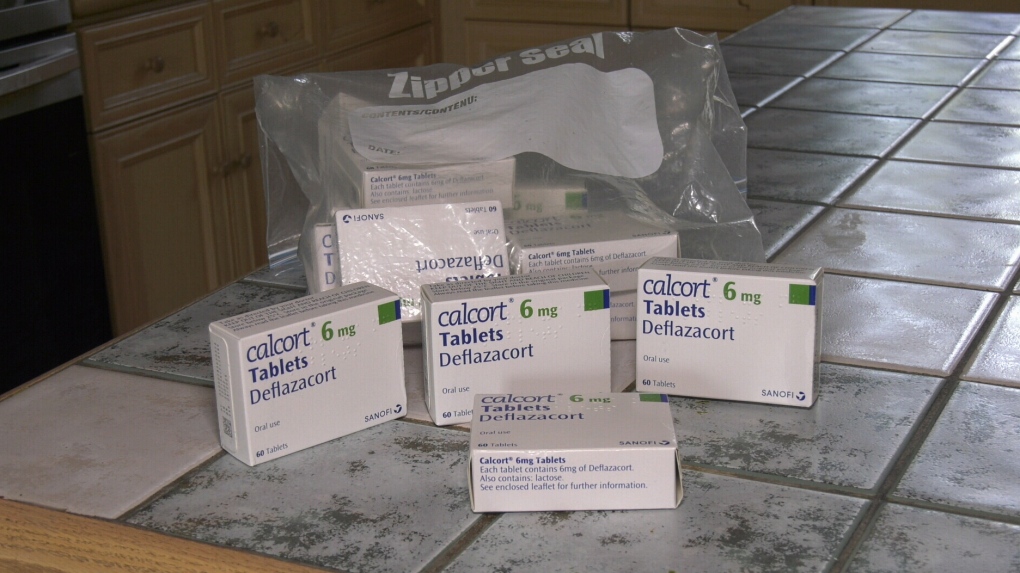Ontario man says medication he's been taking for a decade just quadrupled in price
An Ontario man with Duchenne muscular dystrophy said he was shocked when he got his latest prescription filled for a medication he has been taking for the past ten years.
“I couldn’t believe it. I need to take this medication to help my muscles be able to work a bit better and it has almost quadrupled in price,” said 21-year-old Arun Crishanth of Aurora.
The medication is Deflazacort, a popular drug used to treat Duchenne muscular dystrophy, however it is not covered under government health plans.
The drug is a steroid taken daily to help keep muscles strong and symptoms of muscular dystrophy in check.
Crishanth said he used to get a four month supply of Deflazacort for $187, but when he got his last prescription filled it jumped to $666.
Crishanth was told by his pharmacy Pharmasave that the price increase was due to it being manufactured by a new drug company.
“This new company decided to turn around and quadruple the price. To me it seems ridiculous that they can increase the price that much," said Crishanth.
CTV News Toronto reached out to Pharmasave and a spokesperson said, “Pharmacy pricing in Canada is linked to the cost to purchase the medication from the manufacturer or distributor. The increased pricing experienced by pharmacies (and thus also to patients) is due to manufacturer and distributor changes.”
 Deflazacort, a popular drug used to treat Duchenne muscular dystrophy, is photographed.
CTV News Toronto also reached out to Muscular Dystrophy Canada and its CEO Stacey Lintern said in a statement, “Many individuals and their families have been advised by their doctors that Deflazacort is the most suitable option due to its minimal side effects, with some individuals having been on this treatment for 15 years or more. However, the significant increase in price will have detrimental effects on these individuals and their families.”
Deflazacort, a popular drug used to treat Duchenne muscular dystrophy, is photographed.
CTV News Toronto also reached out to Muscular Dystrophy Canada and its CEO Stacey Lintern said in a statement, “Many individuals and their families have been advised by their doctors that Deflazacort is the most suitable option due to its minimal side effects, with some individuals having been on this treatment for 15 years or more. However, the significant increase in price will have detrimental effects on these individuals and their families.”
CTV News Toronto was unable to reach the new manufacturer of Deflazacourt, however Muscular Dystrophy Canada confirmed the price increase was due to a new manufacturer making the drug in Europe which also means increased shipping costs.
While there are cheaper alternatives, they have side effects and many patients with Duchenne muscular dystrophy feel that Deflazacourt is the preferred treatment.
"It’s a drug I’ve been taking for so many years, since I was 10 years old," said Crishanth, who said the drug will now cost him almost $2,000 a year.
"Obviously they should not be able to increase prices like that. It clearly isn't because of inflation, this is just to make some money and I think it's ridiculous that that can happen," said Crishanth.
Muscular Dystrophy Canada said it's important for patients to have equal access to appropriate treatments at a fair cost and that they will continue to try and influence change with regards to the price hike.
If you or your child is experiencing challenges accessing Deflazacort, you can contact Muscular Dystrophy Canada at research@muscle.ca or call 1-800-567-2873 ext. 1114.
CTVNews.ca Top Stories

B.C. tenants evicted for landlord's use after refusing large rent increase to take over neighbouring suite
Ashley Dickey and her mother rented part of the same Coquitlam duplex in three different decades under three different landlords.
MPP Sarah Jama asked to leave Ontario legislature for wearing keffiyeh
MPP Sarah Jama was asked to leave the Legislative Assembly of Ontario by House Speaker Ted Arnott on Thursday for wearing a keffiyeh, a garment which has been banned at Queen’s Park.
Mountain guide dies after falling into a crevasse in Banff National Park
A man who fell into a crevasse while leading a backcountry ski group deep in the Canadian Rockies has died.
Body of Quebec man who died in Cuba found in Russia, family confirms
A Montreal-area family confirmed to CTV News that the body of their loved one who died while on vacation in Cuba is being repatriated to Canada after it was mistakenly sent to Russia.
Expert warns of food consumption habits amid rising prices
A new survey by Dalhousie University's Agri-Food Analytics Lab asked Canadians about their food consumption habits amid rising prices.
Saskatchewan isn't remitting the carbon tax on home heating. Why isn't my province following suit?
After Prime Minister Justin Trudeau said the federal government would still send Canada Carbon Rebate cheques to Saskatchewan residents, despite Saskatchewan Premier Scott Moe's decision to stop collecting the carbon tax on natural gas or home heating, questions were raised about whether other provinces would follow suit. CTV News reached out across the country and here's what we found out.
Montreal actress calls Weinstein ruling 'discouraging' but not surprising
A Montreal actress, who has previously detailed incidents she had with disgraced Hollywood producer Harvey Weinstein, says a New York Court of Appeals decision overturning his 2020 rape conviction is 'discouraging' but not surprising.
RCMP officers had no legal authority to enter man's home, make arrest: B.C. court
A B.C. man has been found not guilty of assaulting two RCMP officers – with the court finding he was resisting an "unlawful entry and arrest" in his home before he was tasered, taken down and hauled away in handcuffs.
'Deep ignorance': Calls for Manitoba trustee to resign sparked after comments about Indigenous people and reconciliation
A rural Manitoba school trustee is facing calls to resign over comments he made about Indigenous people and residential schools earlier this week.

































